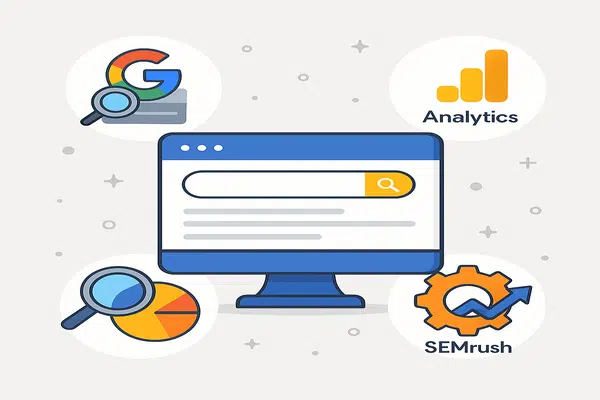Search Engine Optimization (SEO) Tools
What Is Search Engine Optimization (SEO) ?
Search Engine Optimization, commonly known as SEO, is a set of strategies and techniques used to improve the visibility of websites in search engine results such as Google. The primary goal of SEO is to increase organic traffic to a website by optimizing its content and structure to align with search engine guidelines. SEO is a core component of digital marketing, as it enhances brand awareness and attracts potential customers.
Website rankings in search results are influenced by various factors, including content quality, usability, page speed, and inbound links. Websites must be optimized for relevant keywords associated with their industry or service. Search engines analyze these keywords to assess how well a website’s content aligns with users’ search intent. By optimizing these elements, websites can improve their position in search engine results pages (SERPs) and increase their visibility.
The benefits of SEO for businesses are numerous. First, SEO enhances digital visibility and increases conversion rates by bringing in targeted traffic. Second, SEO can significantly reduce marketing costs compared to paid advertising—appearing prominently in organic results doesn’t require ongoing payment. Moreover, SEO helps build credibility and trust with users, which strengthens overall business performance in the digital marketplace. Thus, SEO is a vital investment for companies navigating digital transformation.

Types of SEO Tools Available
There is a wide range of SEO tools available in the market, offering marketers and creators significant opportunities to improve their websites’ performance in search engines. One of the most prominent categories is keyword research tools, which help users identify the most-searched keywords and phrases in their field. These tools estimate search volume, analyze competition, and uncover new keyword opportunities. Tools like Google Keyword Planner and SEMrush enable marketers to make informed decisions about which keywords to target for better traffic results.
In addition, link auditing tools provide valuable information on the health of internal and external website links. Tools like Ahrefs and Moz identify broken links and analyze top-ranking pages, both of which directly affect a site’s search ranking. These tools enhance user experience by improving the website’s link structure.
Other tools focus on performance analysis, such as Google Analytics and Matomo, which offer detailed insights into visitor behavior. They help identify the most popular content and pages that need improvement. Additionally, page speed optimization tools like GTmetrix and PageSpeed Insights measure loading times and offer suggestions to improve the overall digital experience.
With this diverse range of SEO tools, professionals can refine their strategies, discover opportunities, and achieve measurable results in their SEO efforts.
Top SEO Tools Used by Marketers
SEO tools are essential for any digital marketer looking to strengthen online presence and achieve tangible results. Among the most popular tools is Google Analytics, which allows marketers to track visitor behavior and understand user engagement on their website. It provides in-depth data on traffic sources, top-performing pages, and conversion rates, helping marketers fine-tune their strategies for better performance.
SEMrush is another leading tool, offering a comprehensive suite of features including keyword analysis, rank tracking, and competitor monitoring. These capabilities help marketers refine their SEO strategies based on accurate data. However, SEMrush may be costly for some users, making it a tool that requires thoughtful investment for maximum return.
Ahrefs is also highly regarded, especially for backlink analysis. It offers detailed reports on inbound links, helping marketers assess link quality and develop effective link-building strategies. That said, Ahrefs has a steep learning curve that might be challenging for beginners.
Lastly, Moz provides a range of features including keyword and link analysis. It offers practical SEO recommendations but may be considered expensive for smaller businesses. When used collectively, these tools give marketers powerful insights that lead to improved user experiences and stronger overall website performance.

Tips for Using SEO Tools Effectively
SEO tools are critical for success in content marketing and digital strategy. To maximize their effectiveness, marketers should follow several practical tips:
- Set clear and measurable goals. Whether it’s improving rankings for specific pages or increasing traffic to a blog, having well-defined objectives allows marketers to focus their strategies accordingly.
- Interpret data, don’t just collect it. It’s not enough to gather reports—marketers must analyze metrics such as bounce rate and time-on-page to understand user behavior. This insight allows for targeted adjustments that enhance performance.
- Act on recommendations. SEO tools often offer optimization suggestions. These should be implemented regularly to ensure continuous improvement. Even after achieving initial goals, marketers should keep refining their strategies.
- Review progress frequently. Regular audits and updates are essential to keep up with evolving search algorithms and changing user behavior. This ensures the long-term sustainability of SEO success.
By repeatedly applying these best practices and staying consistent, marketers can achieve long-term results and maintain a strong competitive edge in search rankings.








This topic shows you’re thinking like a true content strategist. YouTube SEO tools are essential for visibility and growth!
Brilliant insight! A well-timed website redesign can reignite engagement and drive better results across the board.
Love this! Website specialists bring the expertise to prevent issues before they even happen — total peace of mind!
Love how this topic simplifies something powerful — SEO doesn’t have to be complex to be effective!
This is how businesses stay competitive — smart, organized, and results-driven website management!